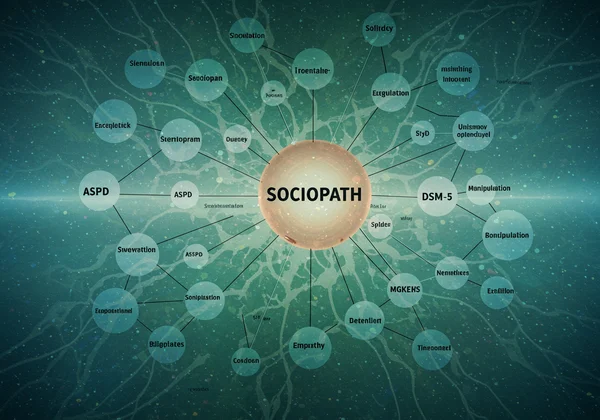Teste de Sociopata: Compreendendo o TPAS e os Critérios do DSM-5
August 4, 2025 | By Roman Caldwell
O termo "sociopata" aparece frequentemente na mídia e nas conversas diárias, geralmente descrevendo indivíduos que são enganosos, manipuladores ou que carecem de empatia. Mas o que isso realmente significa de um ponto de vista clínico e como se relaciona com o Transtorno de Personalidade Antissocial (TPAS)? Este artigo visa esclarecer concepções errôneas comuns, oferecendo uma explicação clara e autoritativa do TPAS baseada nos critérios oficiais do Manual Diagnóstico e Estatístico de Transtornos Mentais, 5ª Edição (DSM-5). Ganhar uma compreensão mais profunda desta condição complexa é vital para promover um maior entendimento, seja para autoconhecimento ou para compreender melhor os comportamentos de outras pessoas.
Para muitos, obter clareza sobre esses traços é um primeiro passo crucial. Se você está buscando insights preliminares, uma ferramenta confidencial pode fornecer um ponto de partida responsável para orientar sua compreensão. Você pode experimentar nossa ferramenta gratuita hoje mesmo. Esta exploração na psicologia do TPAS ajudará você a distinguir o fato da ficção e a compreender suas implicações no mundo real.

O que é Transtorno de Personalidade Antissocial (TPAS)?
Embora "sociopata" seja um termo amplamente reconhecido, o diagnóstico clínico oficial utilizado por profissionais de saúde mental é transtorno de personalidade antissocial (TPAS). O TPAS é uma condição de saúde mental caracterizada por um desrespeito e violação persistentes e generalizados pelos direitos dos outros. Este padrão de comportamento geralmente começa na infância ou no início da adolescência e continua na vida adulta.
É crucial abordar este tópico com a compreensão de que um transtorno de personalidade é um padrão de comportamento profundamente enraizado e persistente, não um humor passageiro ou uma simples falha de caráter. Indivíduos com TPAS frequentemente enfrentam desafios significativos para manter relacionamentos e se conformar às normas sociais e legais.
Definindo Sociopatia Além do Termo da Moda
Então, onde "sociopata" se encaixa? O termo "sociopatia" é considerado um coloquialismo em vez de um diagnóstico psiquiátrico formal. É frequentemente usado de forma intercambiável com TPAS para descrever indivíduos que exibem os traços-chave do transtorno. Embora útil para discussões gerais, carece da precisão clínica do TPAS. Neste artigo, usaremos principalmente o termo TPAS para permanecer alinhados com a estrutura psicológica oficial, ao mesmo tempo em que reconhecemos que muitas pessoas buscam informações usando o termo "sociopata".
Características Essenciais e Padrões de Comportamento
Indivíduos com TPAS exibem uma série de comportamentos que refletem um desrespeito pelos outros. Estes não são incidentes isolados, mas sim um padrão consistente. As características principais incluem falta de empatia, tendência à manipulação e impulsividade. Eles podem parecer charmosos superficialmente, mas muitas vezes têm dificuldade em formar conexões emocionais genuínas e duradouras. Isso pode levar a um histórico de relacionamentos instáveis, problemas de emprego e conflitos frequentes.

Critérios do DSM-5: O Diagnóstico Oficial para TPAS
Para garantir um diagnóstico padronizado e confiável, os profissionais de saúde mental confiam nos critérios do TPAS delineados no DSM-5. Este manual fornece uma lista de verificação específica de sintomas e condições que devem ser atendidos para um diagnóstico formal. O uso desses critérios ajuda os clínicos a diferenciar o TPAS de outros transtornos de personalidade ou problemas de comportamento. Nosso teste gratuito de transtorno de personalidade antissocial é desenvolvido com base nesses padrões estabelecidos para fornecer insights valiosos, embora não diagnósticos.
Características Diagnósticas Essenciais
De acordo com o DSM-5, um diagnóstico de TPAS requer um padrão persistente de desrespeito e violação dos direitos dos outros, ocorrendo desde os 15 anos de idade, indicado por três (ou mais) dos seguintes:
-
Desrespeito às normas sociais relacionados a comportamentos lícitos, indicado pela realização repetida de atos que são motivo de prisão.
-
Enganosidade, indicada por mentiras repetidas, uso de pseudônimos ou enganar os outros para obter lucro ou prazer pessoal.
-
Impulsividade ou falha em planejar com antecedência.
-
Irritabilidade e agressividade, indicadas por brigas físicas ou agressões repetidas.
-
Desprezo imprudente pela segurança de si mesmo ou de outros.
-
Irresponsabilidade consistente, indicada pela falha repetida em manter um comportamento de trabalho consistente ou honrar obrigações financeiras.
-
Falta de remorso, indicada por ser indiferente ou racionalizar ter ferido, maltratado ou roubado outra pessoa.

Requisitos de Idade e Transtorno de Conduta
Uma parte crucial do diagnóstico envolve a idade. O indivíduo deve ter pelo menos 18 anos para ser diagnosticado com TPAS. Além disso, deve haver evidência de Transtorno de Conduta com início antes dos 15 anos. O Transtorno de Conduta é uma condição infantil que envolve um padrão repetitivo e persistente de comportamento em que os direitos básicos dos outros ou as principais normas ou regras sociais apropriadas à idade são violados. Este requisito estabelece que o comportamento antissocial é um padrão de longa data, não algo que apareceu repentinamente na idade adulta.
Sociopata vs. Psicopata: Esclarecendo a Confusão
Uma das perguntas mais comuns é sobre a diferença entre sociopata e psicopata. Assim como "sociopata", o termo "psicopata" não é um diagnóstico oficial do DSM-5. Ambos são usados para descrever traços que se enquadram no TPAS. No entanto, na criminologia e na psicologia, alguns especialistas fazem distinções entre os dois. Compreender essas nuances pode fornecer mais clareza.
Contexto Histórico e Diferenças Semânticas
Historicamente, esses termos têm sido usados para descrever indivíduos que agem sem consciência. A distinção muitas vezes se resume às causas e características percebidas. A sociopatia é, por vezes, considerada resultado de fatores ambientais, como uma criação traumática ou abusiva, que interrompe o desenvolvimento normal da personalidade. A psicopatia, em contraste, é frequentemente acreditada por ter um componente genético ou biológico mais forte, ligado a uma parte subdesenvolvida do cérebro responsável pela regulação emocional.
Traços Distintivos e Manifestações Comportamentais
As principais diferenças frequentemente citadas nas manifestações comportamentais são:
-
Sociopatas são frequentemente vistos como mais erráticos, impulsivos e propensos a explosões de raiva. Embora lutem com a empatia, eles podem ser capazes de formar alguns laços com um indivíduo ou grupo específico, embora esses relacionamentos sejam muitas vezes instáveis. Suas ações podem ser desorganizadas e espontâneas.
-
Psicopatas são frequentemente descritos como mais frios, calculistas e astutos. Eles são frequentemente charmosos e podem imitar emoções de forma convincente, permitindo-lhes manipular os outros eficazmente. Eles são geralmente considerados incapazes de formar laços emocionais genuínos e são altamente organizados em seus esquemas.

Para aqueles interessados em explorar essas diferenças, um teste de sociopata online pode oferecer uma maneira estruturada de refletir sobre esses padrões de comportamento distintos.
Impacto do TPAS no Mundo Real: Navegando Relacionamentos e Sociedade
Os traços associados ao TPAS têm efeitos profundos na vida de um indivíduo e na vida daqueles ao seu redor. As características centrais do transtorno criam um atrito significativo em contextos pessoais, profissionais e sociais. Compreender esses impactos é essencial tanto para autoexploradores quanto para aqueles preocupados com alguém em suas vidas.
TPAS em Relacionamentos Pessoais e Profissionais
Nos relacionamentos, a falta de empatia, a enganosidade e a irresponsabilidade associadas ao TPAS podem ser incrivelmente prejudiciais. Parceiros, familiares e amigos podem se sentir usados, manipulados e constantemente decepcionados. O indivíduo com TPAS pode ter dificuldade em manter amizades de longo prazo ou relacionamentos românticos. No local de trabalho, problemas semelhantes surgem, levando à instabilidade no emprego, conflitos com colegas e falha no cumprimento de obrigações profissionais.
Implicações Sociais e Considerações Legais
Em uma escala mais ampla, o desrespeito às normas sociais e a tendência à impulsividade e agressividade podem levar a problemas legais significativos. Os padrões comportamentais do TPAS, particularmente o desrespeito às regras e aos direitos dos outros, contribuem para uma taxa mais alta de atividades criminosas e encarceramento entre indivíduos com o transtorno. Isso cria um efeito cascata, impactando comunidades e o sistema legal. Se você está questionando certos comportamentos em si mesmo ou em outros, um teste gratuito de sociopata pode ser um passo inicial e privado para obter insights.
Conclusão: Compreendendo o TPAS: Seu Caminho para a Conscientização Informada
Navegar pelo complexo mundo dos traços de personalidade é uma jornada de descoberta. Exploramos como o termo coloquial "sociopata" se relaciona com o diagnóstico clínico de Transtorno de Personalidade Antissocial (TPAS) e detalhamos os critérios oficiais do DSM-5 que o definem. Também esclarecemos a distinção frequentemente confundida entre sociopatia e psicopatia e examinamos o impacto do transtorno no mundo real nos relacionamentos e na sociedade.
Conhecimento é poder. Compreender os sinais e sintomas do TPAS não é sobre rotular você mesmo ou os outros, mas sobre promover a conscientização informada. Ele fornece uma estrutura para reconhecer padrões comportamentais desafiadores e tomar próximos passos responsáveis.
Se este artigo ressoou com você, considere-o um ponto de partida. Pronto para explorar esses traços mais a fundo de forma estruturada e confidencial? Faça nosso teste gratuito de sociopata agora para um resumo instantâneo baseado em conceitos psicológicos estabelecidos. É uma ferramenta valiosa e não diagnóstica para auto-reflexão e um primeiro passo responsável em direção a uma maior compreensão. Lembre-se, para um diagnóstico formal, é sempre melhor consultar um profissional de saúde mental qualificado.
Perguntas Frequentes sobre TPAS e Sociopatia
Qual é a diferença entre sociopata e psicopata?
Embora ambos os termos sejam frequentemente usados para descrever traços do Transtorno de Personalidade Antissocial (TPAS), eles não são diagnósticos clínicos oficiais. Na literatura psicológica, "psicopata" é frequentemente usado para descrever alguém com comportamentos mais calculistas, charmosos e manipuladores, possivelmente ligados a fatores genéticos. "Sociopata" é frequentemente usado para indivíduos que são mais impulsivos e erráticos, com comportamentos possivelmente decorrentes de fatores ambientais como trauma.
Quais são os sinais de um sociopata?
Os sinais são definidos clinicamente sob o TPAS e incluem um padrão persistente de desrespeito pelos direitos dos outros, engano, impulsividade, agressividade, desprezo imprudente pela segurança, irresponsabilidade consistente e falta de remorso. Não se trata apenas de um ou dois desses sinais, mas de um padrão de comportamento generalizado.
Qual é o teste oficial para sociopatia?
Não existe um único "teste oficial" chamado teste de sociopata. Um diagnóstico formal de Transtorno de Personalidade Antissocial (TPAS) só pode ser feito por um profissional de saúde mental qualificado por meio de avaliação clínica abrangente, entrevistas e revisão do histórico pessoal do indivíduo. No entanto, uma ferramenta de avaliação online bem projetada pode servir como uma ferramenta de triagem preliminar valiosa para ajudá-lo a identificar e refletir sobre traços relevantes e decidir se a busca por ajuda profissional é um próximo passo necessário.